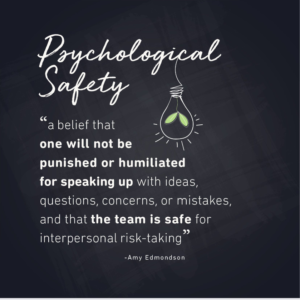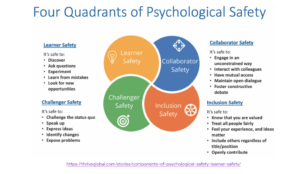
In what way is psychological safety important? As part of her PhD, Professor Amy Edmondson found that, counter intuitively, high performing teams made more mistakes, and have more errors than others.
Let me say this one more time. High performing teams make more mistakes. How can this be a good thing, and add to safety and performance? In her TED talk, Professor Edmondson describes how psychological safety has a learning focus, rather than an execution one.
It seems that the learning culture allows high performing teams to name their mistakes. With this approach, the number of mistakes recorded increases. Psychological safety enables this to happen.
Speaking personally, I would prefer to be flying in a plane, about to go under anaesthetic, or part of a society, where mistakes can be owned and discussed and shared. I think I would be more safe, and the outcomes better.
Without psychological safety, we don’t know how many mistakes the other teams are making. However, it is less likely they are mentioned out loud due to fear of negative consequences. Think Chernobyl. They are more likely to be hidden from other team members.
How can you assess how psychologically safe your team is, and therefore what risks you can take?
Here are some questions Professor Edmondson has devised, which can also be seen in this HBR article here:
- If you make a mistake on this team, it is not held against you.
- Members of this team are able to bring up problems and tough issues.
- People on this team sometimes accept others for being different.
- It is safe to take a risk on this team.
- It isn’t difficult to ask other members of this team for help.
- No one on this team would deliberately act in a way that undermines my efforts.
- Working with members of this team, my unique skills and talents are valued and utilized.
These questions are not an absolute science. They can be used to look for valuable differences between team members and help begin the conversation about your starting point.
Finally, as a team leader, or as a proactive team member, what can you do to model the psychological safety you wish for? There are three fundamental ideas to engage with here:
1. Everything is an experiment
The first fundamental is the learning mindset I have already mentioned. Everything is an experiment, the outcome from which can inform the next. Always be ready to ask “What did we learn from this?”.
2. Make Space to Speak
Build in time to speak. Make it clear that your team’s voices and opinions matter. Model what you want by taking more risk in what you share.
3. Admit Your Mistakes
When something goes wrong, don’t hide it. Share your vulnerabilities and fallibilities with the team. Model your own learning process.
What differences to outcomes could more psychological safety make to your team today? Is there more creativity or collaboration needed? Could more diverse thought generate additional thinking?
In my recent leadership programme “Stepping Into Leadership”, participants examined different types of psychological safety and what they could each do to enhance it in their own place of work.
Where could you start? And what difference could it make?
If you would like to talk more about this, get in touch.
Join our EDI book/podcast club: This month we will be looking at how to be an antiracist with Dr Brene Brown in conversation with Ibram X, Kendi
All are welcome! If you would like to join us and are not already on the list, get in touch, and Gill will send you the zoom link!
Date and Time: Friday 30th June at 12.30pm BST (GMT+1) OR Monday 3rd July at 5.30pm BST (GMT+1).
Gill How loves to work internationally with managers, executives and professionals to help them to evolve, stretch and grow their leadership capability. She is a Master Executive Coach, innovative Leadership Developer and harbours some significant travel and walking goals! If she can help you in developing the potential of the professionals in your organisation, get in touch!
Like this content? Sign up here:
Photo credit: Pexels










Thank you Gill. These is informative and an engaging leadership video. They give a new perspective and are equally applicable in the voluntary and third sectors as in business.
Take them to your Choir, Church, Men’s Shed or whatever and flex your leadership muscles there.
Thank you Martin!